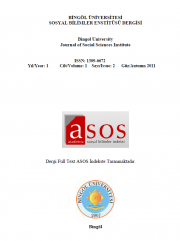EDWARD SAİD VE ÇAĞDAŞ ELEŞTİRİ
EDWARD SAID AND CONTEMPORARY CRITICISM
Author(s): Ahmet KayıntuSubject(s): Theory of Literature
Published by: Bingöl Üniversitesi Sosyal Bilimler Enstitüsü
Keywords: Secular criticism; worldliness; Edward Said; textuality;
Summary/Abstract: The study dealts with the problems of contemporary criticism and its Solutions put forward by Edward Said. In contemporary literary criticism, the concept of text is regarded to be a much more complex formation than a simple communication from an author. But the implicit effect of textuality was to sever the connection of the text from the world. For him, the world from which the text originated, the world with which it was affıliated, was crucial, not only for the business of interpretation but also for its ability to make an impact on its readers. Said shows how the worldliness of the text is embedded in it as a function of its very being. It has a material presence, a cultural and social history, a political and even an economic being as well as a range of implicit connections to other texts. We do not need to dispense with textuality, nor with the centrality of language to show how the embedding of the text in its world, and the network of its affıliations with that world, are crucial to its meaning and its significance, and, indeed, to its very identity as a text. it is the ground on which all Said’s cultural analysis and theory has proceeded.
Journal: Bingöl Üniversitesi Sosyal Bilimler Enstitüsü Dergisi (BUSBED)
- Issue Year: 1/2011
- Issue No: 2
- Page Range: 7-18
- Page Count: 12
- Language: Turkish

